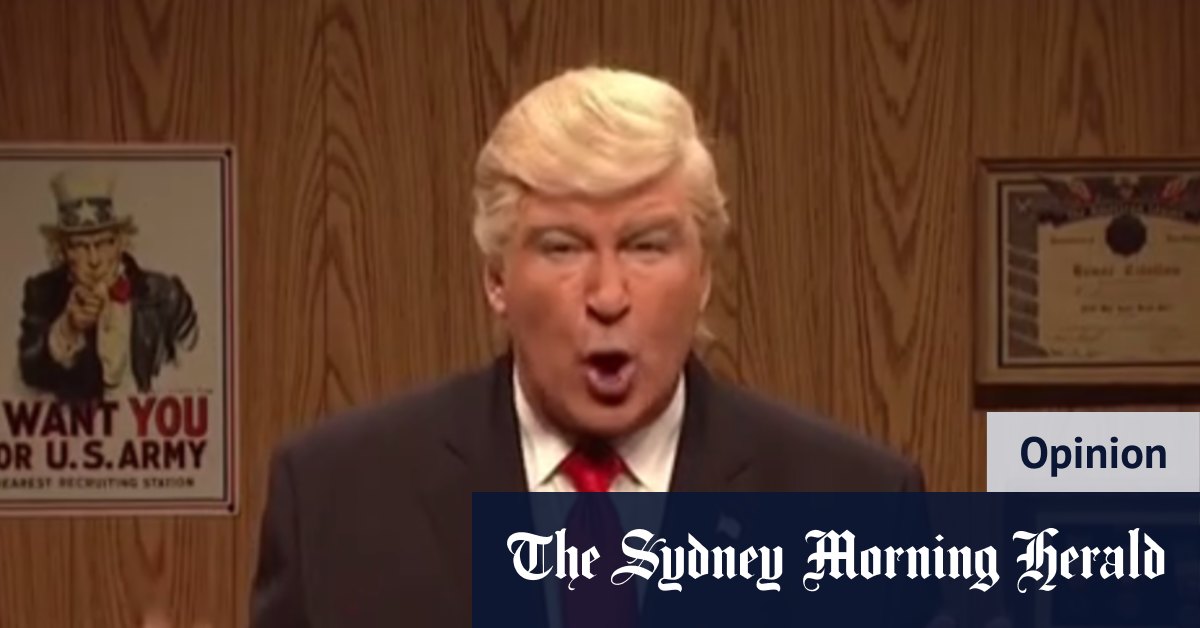
Jason Reitman’s movie Saturday Night, now playing in cinemas, offers a reminder of the crackling sense of self-belief that fuelled SNL at its birth. Set backstage on the night of the show’s debut, the film captures the boundless cockiness of that first group of SNL writers and performers. The show was live. Network TV was central to the culture. America was watching. Anything could happen.
In SNL’s early days, the political satire was broad. During the show’s first season, the bumbling Gerald Ford was president. Chevy Chase, who looked nothing like him, became the show’s resident Ford impersonator. He didn’t wear any special makeup or anything. He just fell over a lot.
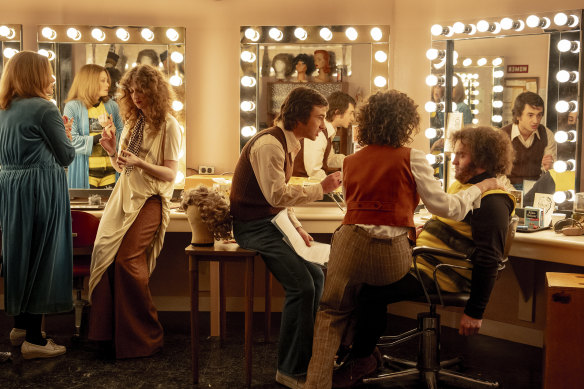
Gabriel La Belle (left) as Lorne Michaels, Rachel Sennott as Rosie Shuster, and Matt Wood as John Belushi in Saturday Night Live.Credit:
When Jimmy Carter succeeded Ford as president, Dan Ackroyd portrayed Carter without even shaving off his moustache. In later years, SNL got more serious about its political impersonations. Dana Carvey, wearing all the appropriate prosthetics, did a bang-on George Bush snr. Darrell Hammond did a candidly libidinous Bill Clinton. Will Ferrell played Bush jnr as a gibbering ninny. Tina Fey did a withering Sarah Palin.
In 1976, the real Gerald Ford made a cameo on the show, inaugurating a tradition of comity between SNL and the politicians it pilloried. Bush snr invited Dana Carvey to the White House, and the two became close friends. Bush jnr claimed to enjoy Ferrell’s mockery of his verbal misadventures. Brutal as Tina Fey’s impression of her was, Sarah Palin was gutsy enough to appear on the show and face the music in person.
This was all very civilised: it showed that America’s politicians were on the same page as its comedians. They had the same basic values, the same innate commitment to democracy. “The fact that we can laugh at each other,” said Bush snr, “is a very fundamental thing.”
All this changed during Trump’s first term. Before becoming president, Trump hosted SNL twice. Once he was in power, relations between him and the show curdled. When Alec Baldwin played him on the show, Trump rancorously denounced him, via Twitter, as an unfunny hack with a “mediocre dieing [sic] career”.
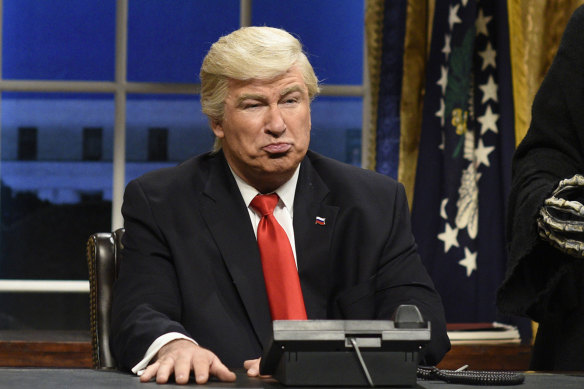
Alec Baldwin portrays President Donald Trump on Saturday Night Live.Credit:
In reply, Baldwin vowed to keep playing Trump until the job was done. “I’d like to hang in there for the impeachment hearings,” he tweeted, “the resignation speech, the farewell helicopter ride to Mar-a-Lago. You know. The good stuff. That we’ve all been waiting for.”
Many American norms were eroded or upended during the first Trump administration. Certainly, the norms at SNL changed. The show had always gone after American politicians. But never before had it suggested that one of them posed an existential threat to democracy. With Trump, the gloves came off.
Baldwin played Trump 46 times on SNL between 2016 and 2020. Halfway through that stint, he was already wondering if there was something counter-productive about his Trump impression. “I think I’m going to do some [more] of it, but not a whole lot,” he said in 2018. “There is a lot of fatigue here.”
Fatigue was right. Half the people in America didn’t need Baldwin to keep reminding them that Trump was absurd. They could see it with their own eyes. The rest of America either didn’t agree, or didn’t think absurdity was an undesirable trait in a president. Forty-six impressions of Trump was both too much and not enough. There was something about the man that defied or defeated satire.
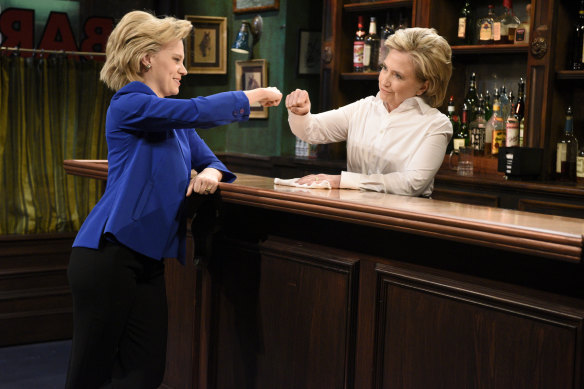
Kate McKinnon as Hillary Clinton and Hillary Clinton as Val on SNL in 2015.Credit: NBCU Photo Bank/NBCUniversal via Getty Images
“Ours is a useful trade,” Mark Twain wrote in 1888, speaking on behalf of America’s humorists. “With all its lightness and frivolity it has one serious purpose … the deriding of shams, the exposure of pretentious falsities, the laughing of stupid superstitions out of existence.”
Hard as America’s satirists tried to laugh Trump off the scene, the underlying logic of their trade no longer seemed to apply in the Trump era. The exposure of pretentious falsities? If you were listing Trump’s flaws, pretentiousness wouldn’t make the top 50.
Previous American politicians had always at least pretended to have qualities – intelligence, decency, integrity – that everybody agreed were virtues. But Trump was cheating the satirists. He wasn’t playing by the old rules. You can’t be false to an ideal if you don’t even acknowledge that the ideal exists.
With Trump, there was nothing for the satirists to expose that hadn’t been grotesquely visible for years. The problem isn’t that his faults remain hidden. It’s that not enough people consider them to be faults.
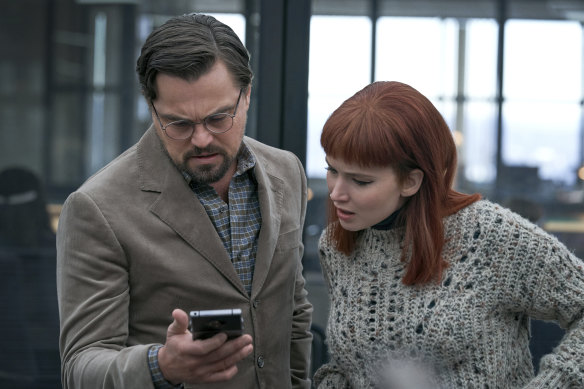
Leonardo DiCaprio and Jennifer Lawrence in Don’t Look Up.Credit:
In 2021, the all-star disaster movie Don’t Look Up took satirical aim at Trump. A giant comet was heading towards Earth. Doom was inevitable unless the world, led by America, could get its act together.
But the American president, played by Meryl Streep, was a female Trump – an unserious oaf with a dangerously short attention span. Instead of blowing the comet out of the sky, she urged her base to chant the reality-denying slogan “Don’t look up”.
Meanwhile, Leonardo DiCaprio, playing an exasperated astrophysicist, vainly tried to make his fellow Americans see sense.
“If we can’t all agree at a bare minimum that a giant comet the size of Mount Everest hurtling toward planet Earth is not a f—ing good thing,” he said, “then what the hell happened to us? What have we done to ourselves?”
Loading
Don’t Look Up failed to avert Trump’s second coming. But at least it succeeded in diagnosing the underlying problem. Nowadays, there is no bare-minimum proposition, no matter how flagrantly true it would seem to be, that all Americans can agree on. That makes it hard for satire to function. But forget about satire. Democracy itself is in trouble, when people stop believing in a common reality.
On the last SNL before the election, the show’s current version of Trump, played by James Austin Johnson, addressed a rally. “I’m out of gas,” he said. “I’m exhausted … Make it stop … Who cares? Nobody cares.”
That sounded more like the writers talking than Trump. Trump never runs out of gas. It was everybody else who did: the fact-checkers, the satirists, the voices of reason. Trump was indefatigable. The comet hit the Earth.
Were the satirists right to fear that its arrival will end American democracy? It’s too early to know. When the dinosaurs died, it wasn’t the asteroid’s impact that killed them. It was all the poisons it released into the atmosphere.



